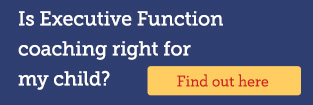As academic coaches, our goal is to teach students how to study and to provide them with tools, strategies and Executive Function support. This particular story is not necessarily one that happens with every student, but it demonstrates the power of coaching combined with a student who is open and willing to learning new ways to manage to their academic demands. As the old proverb goes..."Give a man a fish and you feed him for a day. Teach a man to fish, and you feed him for a lifetime." We like to put our own spin on that saying as it relates to academic coaching: "Give a student a tutor and his homework is done for a day. Coach students to manage their work and themselves, and they will be effective for a lifetime."
particular story is not necessarily one that happens with every student, but it demonstrates the power of coaching combined with a student who is open and willing to learning new ways to manage to their academic demands. As the old proverb goes..."Give a man a fish and you feed him for a day. Teach a man to fish, and you feed him for a lifetime." We like to put our own spin on that saying as it relates to academic coaching: "Give a student a tutor and his homework is done for a day. Coach students to manage their work and themselves, and they will be effective for a lifetime."
A Disorganized Student
Joseph (not his actual name) is a Junior in high school who had a rocky 10th grade year. By his own assessment of the situation, his grades were not great, his organization was non-existent, and his final exams were disappointing. He not only recognized a need for change, but was willing to implement suggestions from me, his academic coach, that would maximize his efficiency and unleash more of his individual talents and strengths. He was ready to hit the ground running from our very first session.
As Executive Function coaches, we would say that this student’s mindset is in Action, rather than Contemplation or Preparation for change. While we see success in moving a student from Pre-contemplation (not recognizing a need for change), to Contemplation and eventually, Action (willing and able to pursue new goals and behaviors), the harmony of matching a coach with a student who is open and ready proves to be a perfect storm for swift, effective change.
Joseph is a big-picture thinker; a top-down processor. He values ingenuity, creative and divergent thinking, and building towards a purposeful life. He is intellectually curious and eager to pursue knowledge, but not always ready to attend to the particular details that the job requires. As follows, a dual view of the big picture and crucial details was needed to achieve a better balance and clearer sight. Concrete tools with clear reasoning as to why they might be useful was integral to my work with Joseph.
To compete with his peers in a rigorous academic program, Joseph needs to get outstanding grades across all subjects and achieve well above average on standardized test scores. He needs to balance after school activities, a varsity sports team, lead a student managed club, manage his social life while at boarding school, and start preparing for college applications. To top it off, he was upset about sustaining an injury that limited his participation in sports. This challenged his emotional regulation, or his ability to maintain an even keel despite disappointment and frustration. His parents were most concerned with his disorganization, level of motivation, test prep, planning and prioritizing, time management skills, and follow through.
Organized Notetaking
Last year, his notes were in random notebooks, binders were full of multiple subjects and there were no sorting strategies. Seeing the large scope of this problem, it was not where I wanted to begin. Instead, we focused on learning about Cornell notetaking, so that he would have a more organized and guided approach to his notes. He adapted easily and saw the extra benefit of this system as it also served as a future study guide. He also recognized that this strategy wouldn’t be useful for every single class, but for the classes that were more lecture-based; the right tool for the right job in the right context is my ever repeating mantra to students. Joseph got this right away.
The Dreaded Planner
Next we focused on one medium-sized challenge and one large-sized obstacle. I was still holding off on the extensive disorganization issue. Success was needed first to fuel the more difficult changes ahead. The medium challenge was learning how to set up SMART (specific, measurable, achievable, realistic, time-bound) goals. He took to goal setting immediately and saw the benefits of honing his focus on a few things, as well as the autonomy of setting his own goals. The larger obstacle was the dreaded planner. His father would painstakingly print out the week’s schedule, which was a great support, but Joseph was not learning how to do this himself. He needed to learn to start asking himself “What’s on the horizon?” and to develop that internal mechanism. I was determined to help Joseph take ownership of his schedule. It took about two weeks for this change to take place, but once it did, Joseph not only kept a very organized weekly and daily schedule, but he started to independently see the need for a monthly view as well. He created his system and became invested in maintaining it. Even months later, he adapts the system independently.
Woven within our sessions were 10-15 minute videos and activities on topics such as mindsets (Carol Dweck), brain development, motivation (Dan Pink and others); even a Charlie Brown book report song! These moments acted as platforms for building his Metacognition skill (reflecting on one’s own thinking and mindsets), an essential tool for enhancing self-awareness and building lasting, positive change. I feel that it is important to teach students about the science behind the coaching suggestions and strategies that I offer them. It's also useful to demonstrate to them that with practice, using these strategies will ultimately improve academic performance. In other words, it’s not just my personal opinion, but an opinion based on facts and experience and backed up by research.
Ready to Get Organized
A month into our weekly coaching sessions, we delved into test prep strategies and, finally, we were ready to get Joseph organized. Test prep had somewhat been integrated while we looked at note taking, but now that Joseph understood the way he best stayed focused and how he could control his environment and also had autonomy over his planning, I needed to provide very little input. Joseph was now taking the helm with little prompting. It was around this time that his father was able to completely relinquish any responsibility towards Joseph’s schedule and homework productivity. Joseph’s mother was reporting how dedicated Joseph had become towards his work and that he needed no reminders to balance all his competing activities.
Getting "Digitally Organized"
Now was the time to help Joseph learn to become organized, not just with his physical materials, but also his digital materials. Today, being "digitally organized" is an absolutely vital aspect of comprehensive organization. I sat with him while we created folders and subfolders and moved random documents away from his computer desktop and into appropriate locations. I remember the look on Joseph’s face when we were done. He had a relaxed smile and turned to me to remark that everything just felt lighter; he now knew exactly where everything was. Joseph used to keep any old homework docs in the trashcan, which he never emptied. This was his system and he knew it didn’t work, but had never had the 30 minute moment we just experienced to see how manageable this could all be. It was a moment of triumph to finally click “empty trash” and hear the whoosh of completion. He immediately set himself a SMART goal to organize whatever was on his desktop at the end of each week; a simple 5 minute task with major gains.
Organizational System of Binders
Now we were ready to organize Joseph's physical materials. At this point, I knew Joseph, how he thinks and how he best learns. Based on this knowledge, I suggested two main (initial) systems. An accordion binder that went in his backpack to hold a space for “homework to do”, “homework to turn in” and a section for each subject. The second system of individual subject binders would be organized by only 3 categories: notes, handouts, test/quizzes/essays (essentially, a test prep section). These individual binders would be kept in his dorm at his boarding school. Before starting his homework, or planning out his to-do’s for the night, I suggested going through the accordion binder and pulling out anything that can go into the binders. Not only does the daily accordion stay light and pertinent, but in sorting handouts or graded work or notes, he would have a chance to review this material. Again, another test prep strategy that supports his memory and keeps him focused on his current school work.
Disorganization is Transformed
Two weeks later, Joseph excitedly showed his mother and I how his accordion binder had only a few pieces of paper in it and that all of his homework had been turned in on time and sorted later into binders. His mom had tears in her eyes and I was absolutely ecstatic and so very proud of this incredibly hard working student. A few weeks later, Joseph told me he had anticipated the next level of organization and would keep sorting boxes at home for the items in his binders that were no longer necessary. Hallelujah! He has developed self-management skills and is beginning to own the organizational strategies that I taught him.
From here on out, Joseph has been keeping up with all of his systems because they work for him. These systems have proven themselves beneficial and essential to his academic success. We now meet via Skype for only 30 minutes each week and Joseph runs the coaching sessions. Last time, he wanted to set up approaches for better time management when school is very busy and to develop a new approach for how to “get ahead” during the slower weeks. He is using our coaching time to refine the Executive Function skills he worked so diligently to develop; skills that will be critical to academic success in college and enable him to be efficient and well organized throughout his professional life.
If coaches gave out grades, Joseph would have all A’s. He has the drive to succeed, but now he also has the tools to get any job done. In terms of the old proverb at the opening of this story, Joseph knows how to fish, and to fish very strategically.
Do you know a disorganized student who might benefit from academic coaching?
Click below for a free consultation today.
photo credit: Andrew from Sydney via photopin cc

